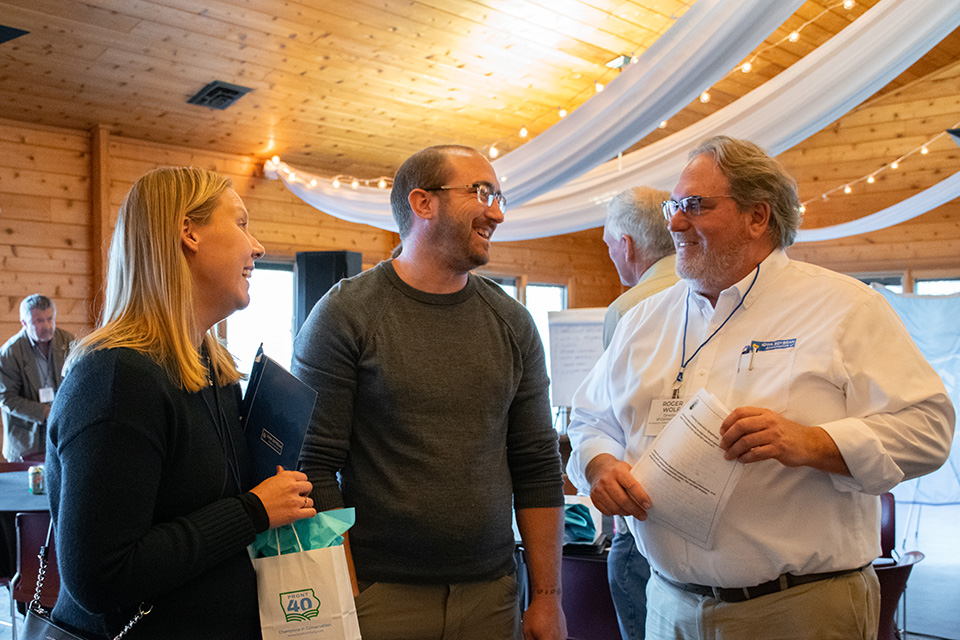
(Photo: Iowa Soybean Association / Mickayla Jordan)
Creating a legacy through local leadership
November 16, 2023 | Mickayla Jordan
“There’s no such thing as a best management practice; it’s about a better management practice, and it’s continuous,” Iowa Soybean Association Director of Conservation, Roger Wolf told 45 conservation leaders on Nov. 14.
Front Forty, a program created to spotlight the innovative stewardship efforts of Iowa’s farmers, is creating the next generation of local agricultural leaders. The Nov. 14 event celebrated program participants, and urged them to continue their efforts in their communities. Front Forty gives Iowa’s conservation leaders a platform to share their stories and promote their conservation efforts. To create local relevancy and local action, Front Forty helps conservation innovators leave a legacy starting in their communities.

Each year, a new class of forty farmers is selected as Front Forty Champions based on their innovative conservation efforts and desire to sustain the agriculture industry. The program’s first year focused on listening to farmers and amplifying their voices. Farmer champions shared with the Iowa Soybean Association (ISA) Research Center for Farming Innovation (RCFI) the practices being utilized, the challenges arising and the needed resources. In return, the Front Forty program provided farmers a platform to elevate their voices.
Now in its second year, farmer champions gathered from around the state to share ideas, build their leadership skillsets and increase their local impact. The event’s purpose: give Iowa’s conservation leaders the tools they need to amplify their voices.
“Every farmer wants to leave a legacy, which is where sustainability comes into play,” says ISA Senior Director of Research, Christie Wiebbecke, PhD.
The best way to leave a legacy is to ensure Iowa’s farmland is still valuable to the next generation of leaders. The best way to do this is to continue to work toward finding better practices. The Front Forty Champions are ready to raise the bar in what is possible with conservation and sustainable farming practices.

Navigating conservation challenges
Through leadership sessions facilitated by Adam Reimer, PhD and Jennifer Simpson, the group explored the challenges limiting conservation practices from full implementation on Iowa farms. Champions shared stories and advice about overcoming the social stigma surrounding utilizing and advocating for conservation practices. The following challenges create barriers to entry when it comes to conservation, the champion say:
No two fields are the same
Conservation is not a ‘one-size-fits-all’ effort, meaning practices must be tailored to each field’s needs. Differences in soil type, organic matter content and slope impact the quality of a field and the conservation practices that can be used.
Tradition is hard to break
Implementing new practices can be an ominous task, especially when current practices produce preferable yields. How do you tell a fellow farmer about conservation practices that could benefit them? The first step is to listen and learn. Before sharing your experiences, listen to the challenges that others are facing.
It’s an investment
“Change is challenging, and it’s not free,” says ISA’s Wolf. This is where deployable resources come into play. From grants to guidance from Front Forty Champions, many resources are available for farmers considering implementing conservation practices. ISA’s Research Center for Farming Innovation is standing by, ready to help.

What’s next?
For the Front Forty Champions, the November event marked the start of their journey as local leaders and conservation advocates. With the necessary tools in their toolbox, the champions will head back to their communities to make an impact and leave a legacy. Through local action, these leaders hope to create a more sustainable future for the agriculture industry.
“It’s not about doing it the right way,” says Front Forty Champion and past ISA Director Chuck White. “I’m trying to do it the better way. I’m always trying to find a better way to do things.”
Meet the Front Forty Champions in your community.
Back